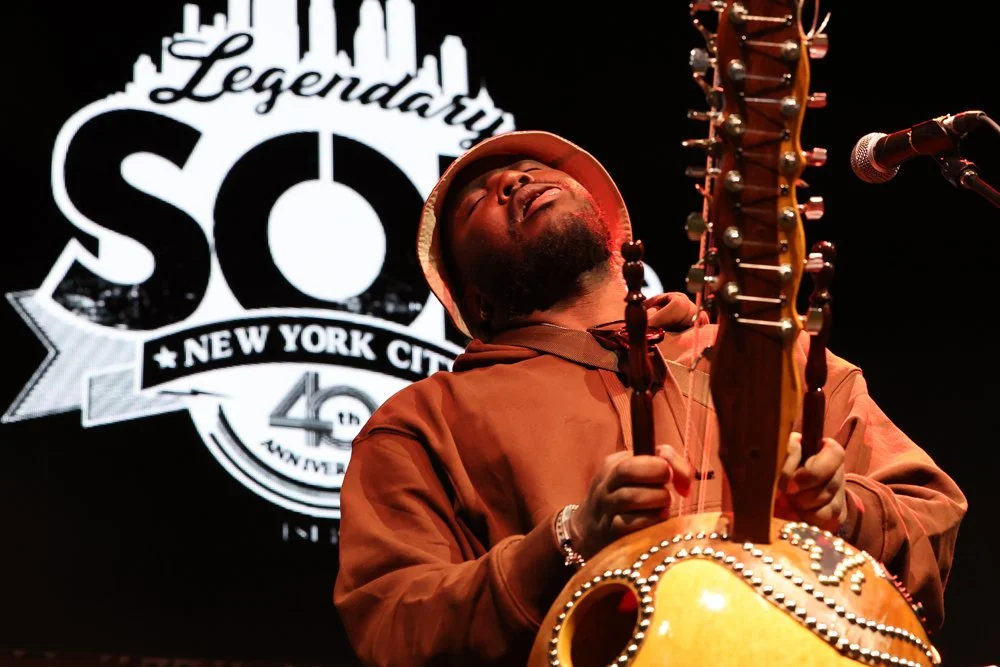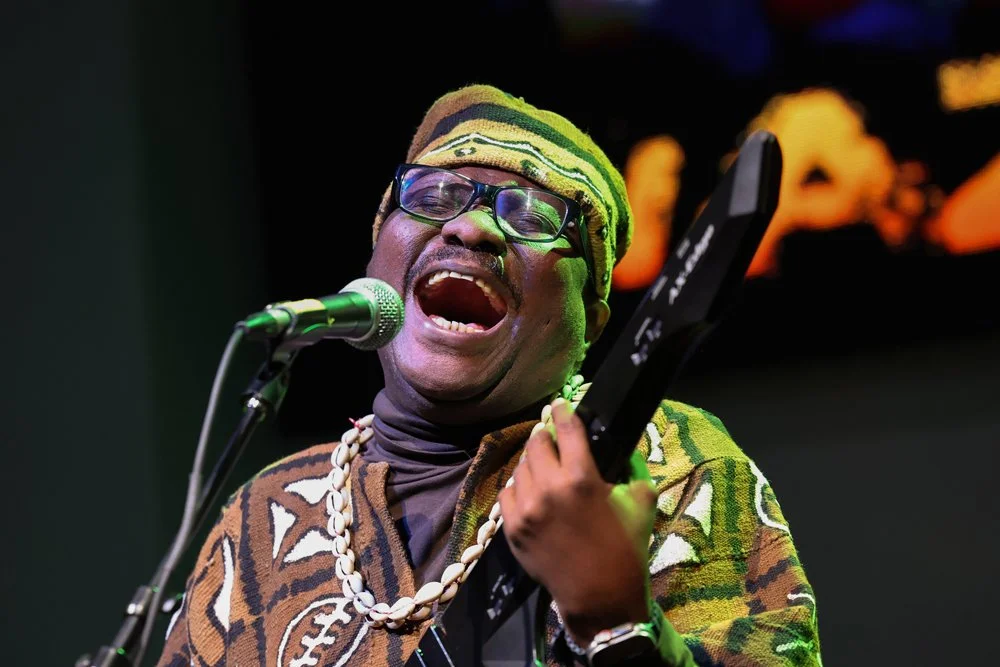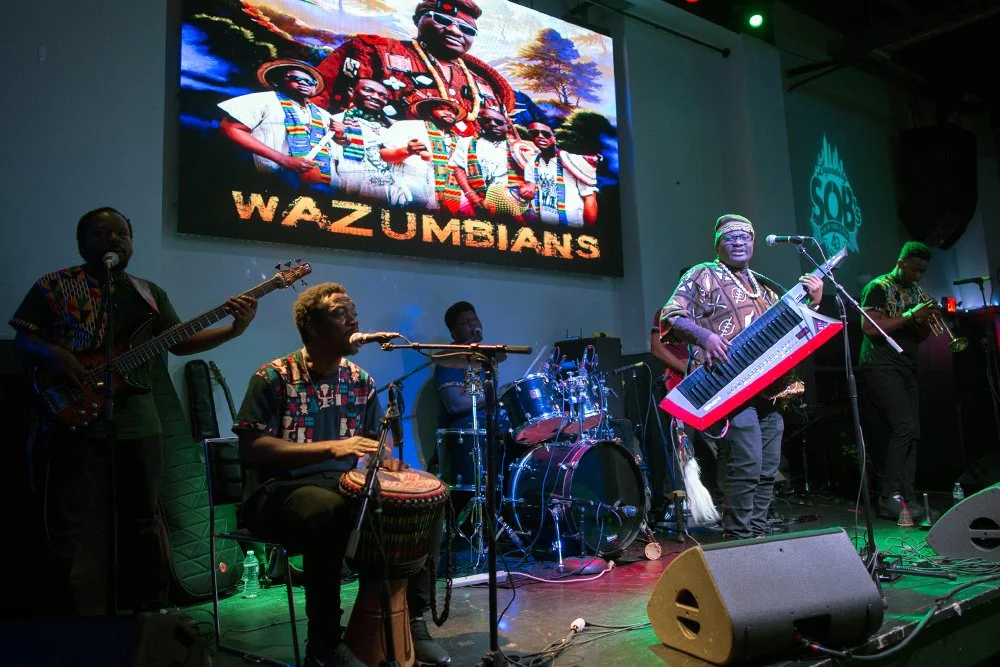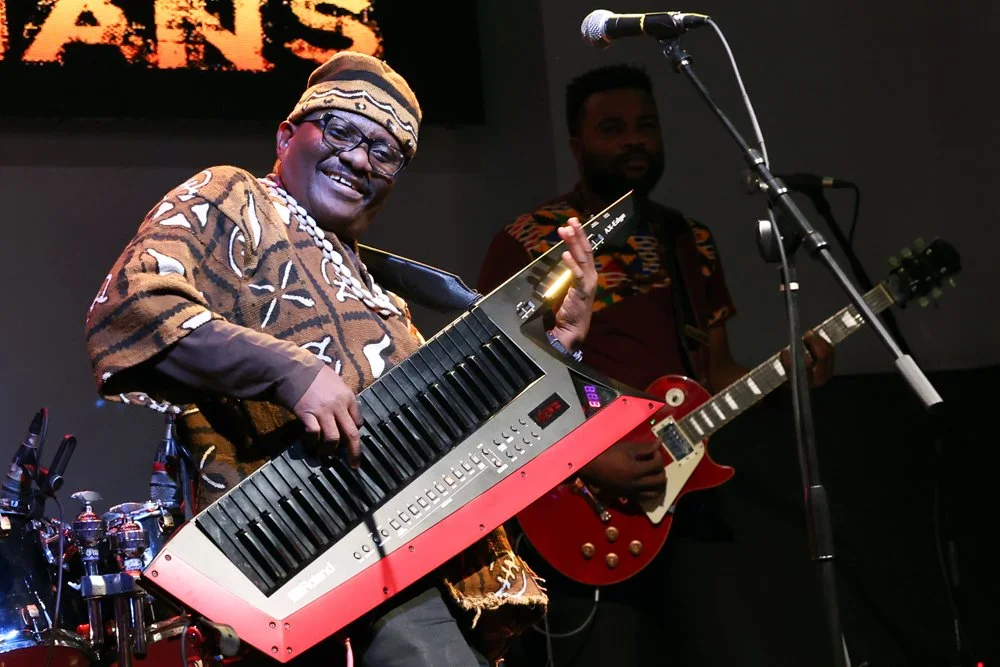Mandingo Festival at SOBs
The Mandingo Festival brought a taste of the grandeur of Manding culture to SOBs, on October 15th. “Kora Boss” Kandia Kora and Maate Keita of Guinee, here for this one-off show were joined by Ghanaian sensation The Wazumbians, who were wrapping up their 2023 summer tour of North America.
Maata Keita of Cote d’Ivoire performing at Mandingo Festival presented by Afromondo Productions at SOBs, October 15, 2023
Hearing African music live in New York City is literally a nomadic experience. The Mandingo Festival, as envisioned by Alex Boicel of Afromondo Productions, is a new live music series dedicated to showcasing the best contemporary talent from West Africa and beyond. Alex spent the past few years in West Africa working with artists there and his goal is to see more African artists performing for audiences here. So he brought over two stars Maate Keita and Kandia Kora to perform at the inaugural show.
Alex would like to produce shows on a weekly basis, an “African Music Night” showcasing local and touring artists where fans know they can find it on a regular basis.
Maate Keita burst on to the international scene at a young age as the lead voice of "Les Go de Koteba” a trio that also included Awa Sangho and Niama Kanté. Their music was a groundbreaking mix of vocal harmonizing over funky percussive rhythms. She described her music as “Afro-Madingue” and the set at SOBs was drawn mainly from her latest album “Djigui” released this past year. She says “I am inspired by everything that has African sounds, to open it to the world. It's my base and I don't limit myself only to Madingue music. Some say that my music is very jazzy, yes because jazz comes from Africa, from everything that is pentatonic. In fact, jazz comes from pentatonic chords, that is to say West Africa, Mali, Burkina, Guinea a little because wassoulou is in Guinea and part of Côte d'Ivoire. “
Kandia Kora with Ahmed Fofana keys , programmig; Gilbert Diabate, bass; Jeremie John, drum kit and saxophone; and Moussa Drame, percussion
Headliner Kandia Kora, dubbed the "Kora Boss" downplayed that aspect of his music, rather emphasizing soulful afropop grooves. His vocals, warm and earthy. reminiscent of Oliver Mtukudzi. An all-star band backed Kandia and Maate, featuring Ahmed Fofana on keys and programming. Fofana is from Mali and is known for his work in the Wassalou trance and groove band P-Pentatonique. On bass from Guinea was Gilbert Diabate. Now based in Harlem he performs here with his wife, vocalist Fanta Diabate. Jeremie John, from Mali on drum kit and saxophone, and Ivorian percussionist Moussa Drame who is known in New York for his work with Kotchegna Dance Company and Fanta Diabate. The setting and collaboration made for two sets of riveting music.
Kandia Kora at the Mandingo Festival, October 15th at SOB’s. Kandia has worked with Salif Keita, Taken Jah Fakoly, Sidiki Diabate, and Mory Kanté.
The Wazumbians, from Accra, reached an international audience via social media. Their monthly live, online performances tagged as “Jankalanga” began during the pandemic, growing their reputation as a live act. It led to their six-month North American tour.
The six-member band we heard at SOBs is just a fraction of the percussion-rich full band of over 20 members. They honed their sound on the road to sharp Afrofusion grooves based on Highlife, Afrobeat, and indigenous rhythms that seamlessly stretched one into the next.
The Wazumbians from Ghana
The energy they radiate flows from leader Francis “Wazumbi” Chapman Abban-Hagan. Wazumbi with a Roland Keytar strapped over his shoulder is a whirlwind on stage, his rough-hewn vocals beckoning toe tappers onto the dance floor. We saw the band perform three times during their tour and they always gave 100% on stage, never failing to win over the audience.
Francis Wazumbi and the Wazumbians at SOB’s
Many of those arriving late were there for Kandia Kora and sang the lyrics to his songs along with him. Like The Wazumbians, Kandia releases new work in video clips, some with over a million views, often collaborating with contemporaries including Azaya and Black M. Kandia and the current generation of artists growing up in the digital era, have established a distinctly Guinean modern sound. These musicians no longer embrace the traditional role but the tradition is present in their music.
Singer Myriam Fatim and Maate Keita. Keita, suprised to see her old friend , said after ”It was a pleasure, a dream come true to find her again, and that we found ourselves on stage like this, it was strong, really very strong for me because it took me back years and it was truly an immense joy.”
All three artists came into music from diverse backgrounds. Wazumbi started out as a studio engineer working with major artists in his studio in Accra and in Nigeria including Ras Minano, 2Face, Righteous Man, and Papa Yankson among others. He went on to be the musical director for Blakk Rasta.
Kandia was born into a dynasty of griots in Conakry and is younger brother to Sekou Kouyate.
Maate’s talent and love of singing and dancing convinced her mentor to bring her into the Koteba ensemble at 14 years of age. She says “The relationship I had with Souleymane Koly was truly that of father and daughter because I joined the Koteba ensemble very young, I was barely 14, so I learned everything there. I spent more time with him than with my mother. And being a single mother who did not go to school, my mother, like all single mothers, was concerned about her daughter's education.”
Maate Keita with Ahmed Fofana keys , programmig; Gilbert Diabate, bass; Jeremie John, drum kit and saxophone; and Moussa Drame, percussion









